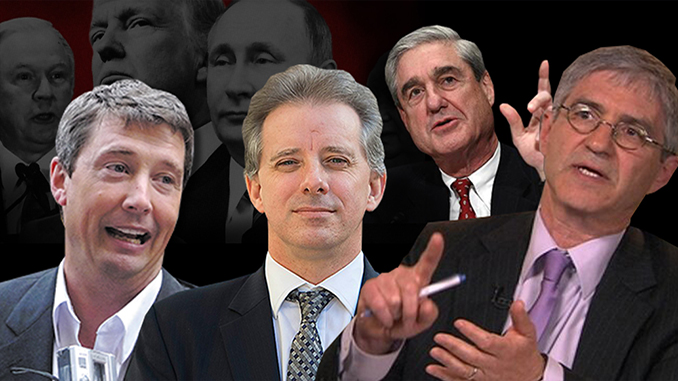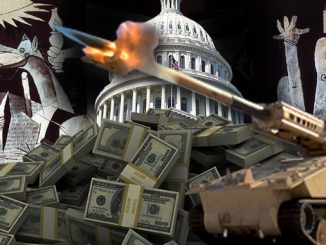
Former mainstream journalist Michael Isikoff of Washington Post, Newsweek, and NBC News fame has clearly begun questioning the infamous Steele Dossier. Has the Russiagate collusion theory finally collapsed?
By S.T. Patrick
Radio host John Ziegler was not supposed to stymie veteran journalist and author Michael Isikoff. Ziegler was a friendly interviewer for Isikoff, the coauthor of Russian Roulette: The Inside Story of Putin’s War on America and the Election of Donald Trump. But Isikoff, one of the earliest Washington, D.C. journalists to go all-in on Russiagate, is now in a precarious situation. Certain that special prosecutor Robert Mueller would find clear evidence that the 2016 Donald Trump campaign had colluded with Russian agents to use hacked DNC emails to influence voters, Isikoff had also eagerly accepted the now-dubious Steele dossier as fact. Two years later, the initial Russiagate thesis is dwindling and its major proponents have been left twisting in the wind.
In the guest introduction, Ziegler calls Isikoff “one of the few journalists he actually respects” and declares himself a “big fan.” Listeners then know that this is going to be a game of slow-pitch softball with Isikoff batting clean-up. So when asked to compare Trump’s situation with that of pre-impeachment Bill Clinton, Isikoff carefully now sidesteps the direct accusations made in his 339-page book.
Ten months after its publication, Isikoff now says, “Look, with Donald Trump, I think it’s fair to say we don’t have the full, complete evidence of what prosecutors have accumulated… . We don’t know exactly what [Michael] Cohen’s testimony is about his conversations with then-candidate Trump. . . . We still need to know exactly what the evidence is on this case.”
In comparing Clinton to Trump throughout the interview, Isikoff pointed out that it was the story of sexual compromise in a Russian hotel room that really had kicked off the Russiagate theories. But it is that story, the tale of Trump and Russian hookers, that Isikoff surprisingly and openly calls the “sensational, uncorroborated allegation in the Steele dossier that kicked off the Russia story into outer orbit.”
Isikoff’s mention of the Steele dossier prompted a follow-up from the host, who said, in the question, that the dossier had been “unfairly derided, especially by Trump fans.” Having just set up his guest to hit from the tee, Ziegler asks, “Would you agree that a lot of what is in the Steele dossier has been at least somewhat vindicated?” The use of qualifying terms in the question allowed Isikoff an enormous amount of room to say, “Yes.”
“No,” Isikoff answered.
“You would not?” Ziegler asks, sounding completely stunned.
“No,” Isikoff repeats.
When Ziegler asked why Isikoff now questions the document upon which much of his book’s thesis was based, Isikoff attempted to dance around the outer edges of the issue without flatly denying the dossier, and thus his own work.
“I think, in broad strokes, Christopher Steele was clearly on to something, that there was a major Kremlin effort to interfere in our elections,” Isikoff said cautiously with a wide array of careful pauses, “that they were trying to help Trump’s campaign, and that there were multiple contacts between various Russian figures close to the government and various figures in Trump’s campaign. That much has been established by the public record.”
Then came the surprise clarification that Trump supporters never saw coming from the veteran of The Washington Post, Newsweek, and NBC News.
“When you actually get into the details of the Steele dossier, the specific allegations, we have not seen the evidence to support them,” Isikoff said. “In fact, there is good grounds to think that some of the more sensational allegations will never be proven and are likely false. So I think it’s a mixed record at this point. . . . Based on the public record at this point, I have to say that most of the specific allegations have not been borne out.”
Near the end of the interview, Ziegler finally asked Isikoff the biggest question at hand: Is the case for Russian collusion imploding? Isikoff stumbled over some words and answered in an attempt to save his own credibility.
“I think the case we made in Russian Roulette, that the Russian government launched an unprecedented effort to interfere in our democratic process, is rock solid,” Isikoff said. “I think that case has been more than supported by Robert Mueller’s investigation. . . . That’s real. . . . Whether that translates into the magic word ‘collusion’ or ‘criminal charges to others in the Trump campaign’ . . . we are not there, and I think the evidence is growing that we are likely not going to be there. All the signs to me are that Mueller is reaching his end game and that we may see less than what many people want him to find.”
Isikoff is surprisingly honest in the interview. He is one of the many journalists who are now having to recognize the harsh reality of their withering political dreams if they want to continue with this story. Mueller, himself, who was recently granted another six months to make his case, has had to widen the scope of the investigation because the original Russiagate collusion story is faulty—or nonexistent. While there have been unethical misdoings by some officials that have surrounded Trump, the Russiagate story is, from all appearances, a stockpile of “fake news.”
S.T. Patrick holds degrees in both journalism and social studies education. He spent 10 years as an educator and now hosts the “Midnight Writer News Show.” His email is [email protected].




